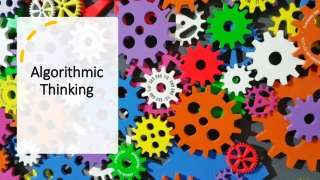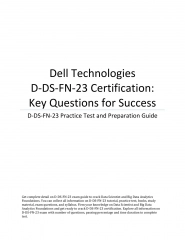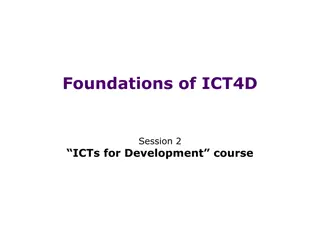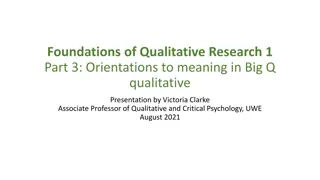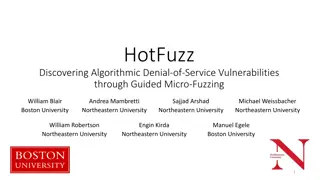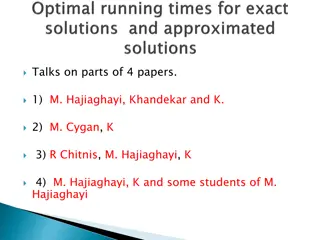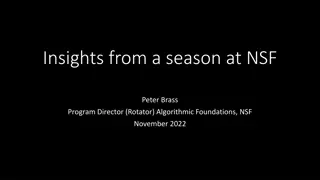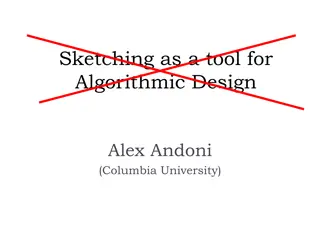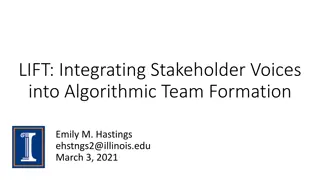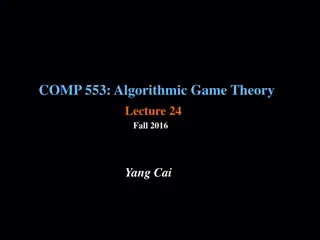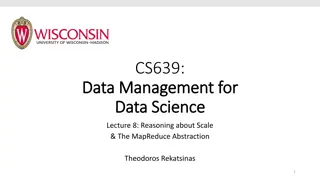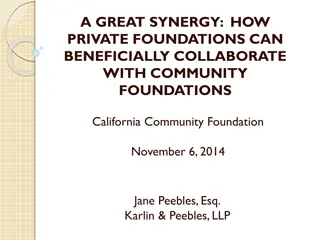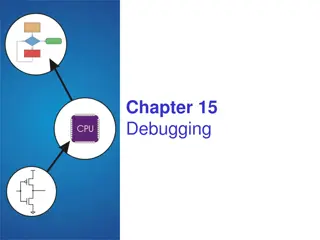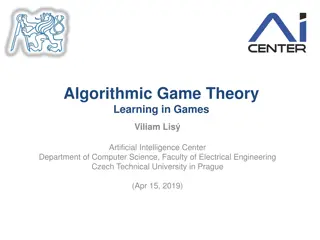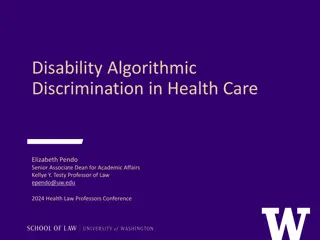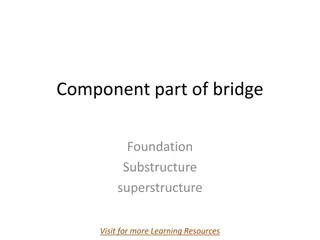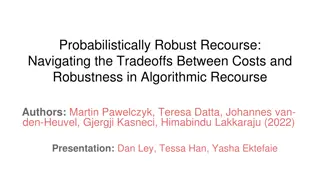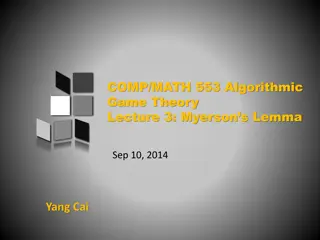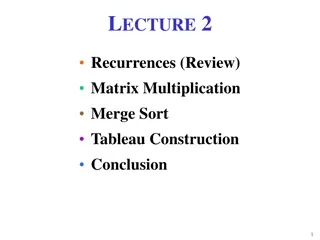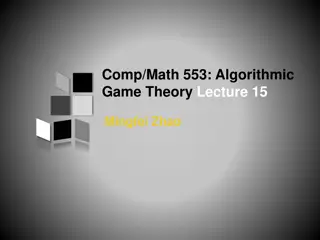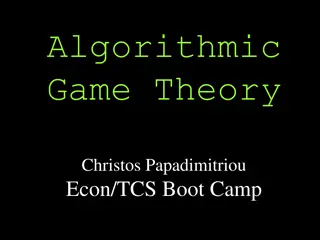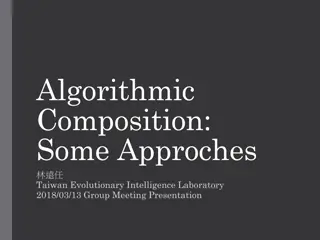Understanding Algorithmic Thinking: Key Concepts and Importance
Algorithmic thinking is a crucial skill that involves problem-solving through precisely defined instructions. This competency, applicable beyond computing, entails analyzing problems, identifying steps to solve them, and designing efficient algorithms. The importance of algorithmic thinking lies in
1 views • 13 slides
Master D-ISM-FN-23 Elevate Dell Information Storage and Management Foundations 2023
Achieve mastery in D-ISM-FN-23 Exam. Excel in Dell Technologies Information Storage and Management Foundations 2023 with comprehensive study materials, practice tests, and expert guidance.\n\/\/ \/pdf\/D-ISM-FN-23\/
1 views • 6 slides
Dell Technologies D-DS-FN-23 Certification | Key Questions for Success
Click Here--- \/\/bit.ly\/43cBBN0 ---Get complete detail on D-DS-FN-23 exam guide to crack Data Scientist and Big Data Analytics Foundations. You can collect all information on D-DS-FN-23 tutorial, practice test, books, study material, exam questions, and syllabus. Firm your knowledge on Data Scient
1 views • 9 slides
D-DS-FN-23 Dell Technologies Data Scientist and Big Data Analytics Foundations 2023 Exam
Prepare for the D-DS-FN-23 exam with confidence. Master the Dell Technologies Data Scientist and Big Data Analytics Foundations 2023 certification with comprehensive study materials, practice tests, and expert guidance. Gain the skills and knowledge needed to excel in big data analytics. Our resourc
1 views • 6 slides
Comprehensive Overview of ABE Lab Manual and Foundations of Biotech Package
The ABE Lab Manual, authored by Doreen Osgood, MS, PhD, is a comprehensive resource for biotechnology education, including sequences like Genetic Engineering and Colony PCR. The manual includes teacher and student guides, along with related resources like PowerPoint presentations and lists of labora
1 views • 5 slides
Foundations of ICT4D
Delve into the technological foundations of ICT4D by examining the ICT value chain, data quality, ICT4D stakeholder roles, global stakeholders, and domains of ICT4D policy. Understand the impact of ICT in development and the diverse range of stakeholders involved in shaping ICT4D initiatives. Explor
6 views • 12 slides
Understanding Qualitative Research: Foundations and Orientations
Explore the foundations of qualitative research and orientations to meaning in Big Q qualitative methods. Delve into the values, characteristics, and theoretical underpinnings of qualitative inquiry, and reflect on the significance of meaning-making in research. Consider the role of subjectivity in
0 views • 23 slides
HotFuzz: Discovering Algorithmic Denial-of-Service Vulnerabilities
A detailed exploration of algorithmic complexity bugs and insight into distributed micro-fuzzing methods. The study uncovers vulnerabilities through guided micro-fuzzing approaches, emphasizing the importance of AC bug detection and fuzz testing techniques such as seed inputs, fuzz observations, and
0 views • 14 slides
Training in Evangelism by Dr. John Kwasi Fosu - Biblical Foundations and Practical Approaches
Discover the essence of evangelism through this training guide by Rev. Dr. John Kwasi Fosu. Explore the biblical foundations, motives, methods, and strategies for effective witnessing using personal testimonies and scripture. Engage in the significance of sharing the Gospel in various settings and l
0 views • 9 slides
Understanding Experiential vs. Critical Qualitative Research
Delve into the foundations of qualitative research with a focus on experiential and critical approaches. Explore key concepts, defining characteristics, and theoretical foundations, distinguishing between qualitative and quantitative research. Reflect on different orientations, subjectivity, and ref
0 views • 16 slides
Exploring Key Characteristics of Qualitative Research in Psychology
The lecture series delves into the values, characteristics, and theoretical foundations of qualitative research, emphasizing the differences from quantitative methods. It explores experiential and critical qualitative camps, subjectivity, reflexivity, and ontological and epistemological foundations.
4 views • 18 slides
Understanding the Right to an Explanation in GDPR and AI Decision Making
The paper delves into the necessity for Explainable AI driven by regulations such as the GDPR, which mandates explanations for algorithmic decisions. It discusses the debate surrounding the existence of a legally binding right to explanation and the complexities of accommodating algorithmic machines
0 views • 22 slides
Legal and Policy Foundations of VA's Homeless Programs
This presentation discusses the legal and policy foundations of the VA's homeless programs, covering historical perspectives, early national policies, major legislations, and the impact of research on homeless programs. Presenters Roger Casey, PhD, LCSW, and Paul Smits, LCSW, provide insights into t
0 views • 40 slides
Evolution of Algorithms and Computer Science Through History
The history of algorithms and algorithmic thinking dates back to ancient times, with the development of general-purpose computational machines by Charles Babbage in the 19th century marking a significant advancement. The term "computer science" emerged in 1959, encompassing theoretical computer scie
1 views • 39 slides
Computational Thinking, Algorithms & Programming Overview
This unit covers key concepts in computational thinking, including decomposition, abstraction, and algorithmic thinking. Decomposition involves breaking down complex problems, abstraction focuses on identifying essential elements, and algorithmic thinking is about defining clear instructions to solv
1 views • 5 slides
Understanding Algorithmic Thinking in Digital Systems
Explore the application of algorithmic thinking in digital systems through the journey of Mike Clapper, the Executive Director of AMT. Learn about recognizing patterns in data, creating algorithms to solve problems, and utilizing information systems creatively. Enhance your knowledge of digital syst
0 views • 56 slides
Insights into Advanced Algorithmic Problems
Delve into discussions surrounding complex algorithmic challenges, such as the limitations in solving the 3-SAT problem within specific time bounds, the Exponential Time Hypothesis, proving lower bounds for algorithms in various scenarios, and exploring approximation ratios in algorithm design. Thes
1 views • 65 slides
Understanding Combinators and Computability: Unveiling the Foundations
Delve into the realm of combinatorial logic and computability through the lens of SKI combinators, exploring their Turing completeness and connection to algorithmic decision-making. Discover the historical significance of Hilbert's program, Godel's incompleteness proofs, the Church-Turing thesis, la
0 views • 65 slides
Insights from a Season at NSF: Program Director's Perspective
An experienced Program Director at NSF shares personal insights and experiences working within the Algorithmic Foundations group, overseeing programs in areas like robotics and scalable systems. The role of a Program Director, the structure of NSF, and the funding mechanisms for basic research are d
0 views • 25 slides
Sketching as a Tool for Algorithmic Design by Alex Andoni - Overview
Utilizing sketching in algorithmic design, Alex Andoni from Columbia University explores methodologies such as succinct efficient algorithms, dimension reduction, sampling, metric embeddings, and more. The approach involves numerical linear algebra, similarity search, and geometric min-cost matching
0 views • 18 slides
Islamic Finance: Ethical Foundations and Compliance Challenges
Examining the structural and ethical foundations of Islamic finance, this content delves into how it differs from conventional finance, focusing on prohibitions such as riba (interest) and gharar (uncertainty). It also raises questions about the compliance of Islamic financial practices with ethical
0 views • 17 slides
Algorithmic Issues in Tracking: A Deep Dive into Mean Shift, EM, and Line Fitting
Delve into algorithmic challenges in tracking tasks, exploring techniques like mean shift, Expectation-Maximization (EM), and line fitting. Understand the complexities of differentiating outliers and inliers, with a focus on segregating points into best-fit line segments.
0 views • 44 slides
Understanding Greedy Algorithms in Algorithmic Design
Greedy algorithms in algorithmic design involve making the best choice at each step to tackle large, complex problems by breaking them into smaller sub-problems. While they provide efficient solutions for some problems, they may not always work, especially in scenarios like navigating one-way street
1 views • 9 slides
Enhancing Algorithmic Team Formation Through Stakeholder Engagement
Integrating stakeholder voices is crucial in algorithmic team formation to ensure a positive team experience, quality outcomes, and high performance. This research explores learner-centered approaches and considers various team formation methods, highlighting their strengths and weaknesses in educat
0 views • 37 slides
Understanding Brouwer's Fixed Point Theorem and Nash's Proof in Algorithmic Game Theory
Explore the foundational theorems of Brouwer and Nash in Algorithmic Game Theory. Dive into Brouwer's Fixed Point Theorem, showcasing the existence of fixed points in continuous functions. Delve into Nash's Proof, unveiling the Nash equilibrium in game theory. Discover visualizations and constructio
0 views • 23 slides
Understanding Scalability and Algorithmic Complexity in Data Management for Data Science
This lecture delves into the concept of scalability in data management for data science, covering operational and algorithmic aspects. It discusses the importance of efficient resource utilization, scaling out to multiple computing nodes, and managing algorithmic complexity for optimal performance i
0 views • 47 slides
Proposal for Directive to Enhance Working Conditions in Platform Work
The proposal aims to address challenges in platform work, including employment status classification and algorithmic management issues. It seeks to improve transparency, fairness, and accountability in algorithmic decision-making, correctly determine employment status, enhance transparency in platfo
0 views • 13 slides
Understanding Foundation Funding for Faculty Research
Explore the role of foundations in supporting faculty research, including basics of foundations, top science funders, types of foundations, what they fund, and how universities engage with them. Learn about the preferences and criteria of foundations in funding niche science projects. Gain insights
0 views • 18 slides
Private Foundations: Advantages, Benefits, and Collaborations
Explore the benefits of private foundations, including control over grant-making, donor recognition, tax advantages, and collaboration possibilities with community foundations. Understand the differences between private foundations and donor-advised funds, the formation of private family foundations
0 views • 72 slides
Understanding Debugging in High-Level Languages
Debugging in high-level languages involves examining and setting values in memory, executing portions of the program, and stopping execution as needed. Different types of errors – syntactic, semantic, and algorithmic – require specific debugging approaches. Syntactic errors are related to code l
0 views • 9 slides
Algorithmic Game Theory Learning in Games by Viliam Lis
The content discusses the concept of algorithmic game theory learning in games, covering topics such as online learning, prediction, best response dynamics, and convergence to Nash equilibrium. It explores how simple learning agents achieve equilibrium outcomes and the application of algorithms in v
0 views • 23 slides
Algorithmic Discrimination in Health Care: Protecting Vulnerable Patients
Elizabeth Pendo and Jennifer D. Oliva discuss disability discrimination in health care algorithms, advocating for legal protections under Section 504, ADA, and ACA. Their article proposes strategies to combat algorithmic bias and enhance antidiscrimination efforts in the 2024 Section 1557 final rule
0 views • 13 slides
Complete Guide to Bridge Foundations and Substructures
Explore the various components of bridge construction such as foundations, substructures, and superstructures. Learn about the different types of bridge foundations including spread, raft, grillage, inverted arch, pile, well, and caisson foundations. Discover the functions of bridge foundations in c
0 views • 16 slides
Navigating Tradeoffs in Algorithmic Recourse: A Probabilistic Approach
This paper introduces PROBE, a Probabilistically Robust Recourse framework allowing users to balance cost and robustness in algorithmic recourse. Users can choose the recourse invalidation rate, enabling more tailored and efficient recourse management compared to existing methods. PROBE enhances cos
0 views • 17 slides
Understanding Myerson's Lemma in Algorithmic Game Theory
Myerson's Lemma is a fundamental concept in algorithmic game theory, particularly in the context of Sponsored Search Auctions. This lecture delves into the application of Myerson's Lemma to ensure truthful bidding as a dominant strategy, maximize social welfare, and maintain polynomial running time
0 views • 19 slides
Understanding Algorithmic Complexity Measures and the Master Method
In this study, we explore key concepts in algorithmic complexity, including recurrences, matrix multiplication, merge sort, and tableau construction. We delve into the Master Method for solving recurrences, examining Cases 1, 2, and 3, and providing solutions for each scenario. Additionally, we disc
0 views • 61 slides
Algorithmic Game Theory Lecture on Prophet Inequality and Auction Design
In this lecture on Algorithmic Game Theory, Mingfei Zhao discusses the Prophet Inequality and its application to single-item auctions. The lecture covers the concept of Prophet Inequality, strategies to guarantee expected payoffs, and different auction designs such as the Bulow-Klemperer Theorem and
0 views • 10 slides
Evolution of Algorithmic Game Theory in Computer Science
The evolution of Algorithmic Game Theory (AGT) in the realm of Computer Science showcases the intersection of economics and theoretical computation. Before 1995, notable researchers like von Neumann and Megiddo laid the foundation for AGT. Concepts such as computation as a game, bounded rationality,
0 views • 62 slides
Exploring Algorithmic Composition Techniques in Music Generation
Algorithmic composition involves the use of algorithms to create music, mimicking human composers by generating music based on specific rules and structures. This presentation delves into various approaches such as DeepBach, MuseGAN, and EMI, highlighting the use of evolutionary algorithms, machine
0 views • 35 slides
Comprehensive Guide to Pile Foundations
Pile foundations are deep foundations consisting of long slender columnar elements, typically formed by a pile cap and single or group of piles. They are classified based on load-carrying characteristics, material of pile construction, and soil effects. Different installation methods include pile dr
0 views • 10 slides
